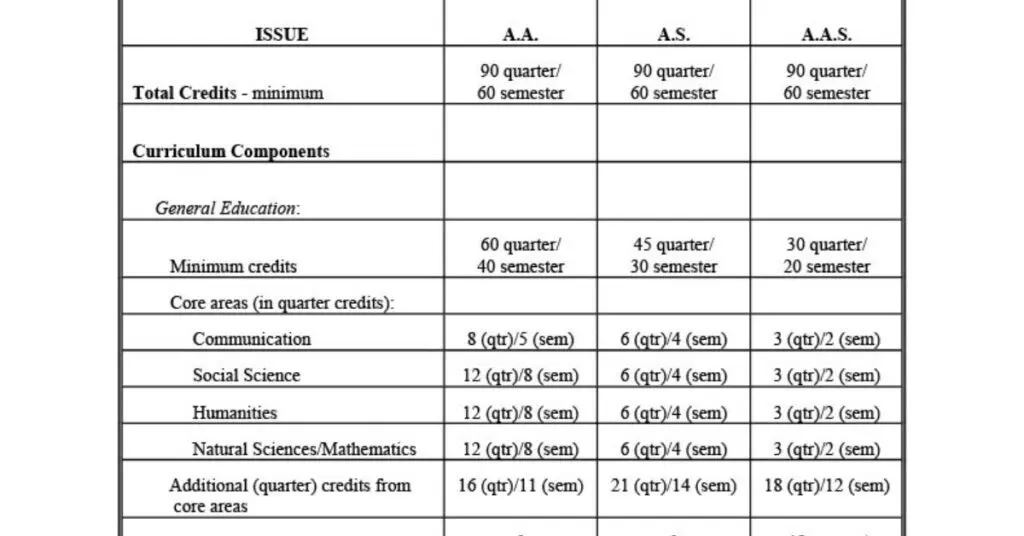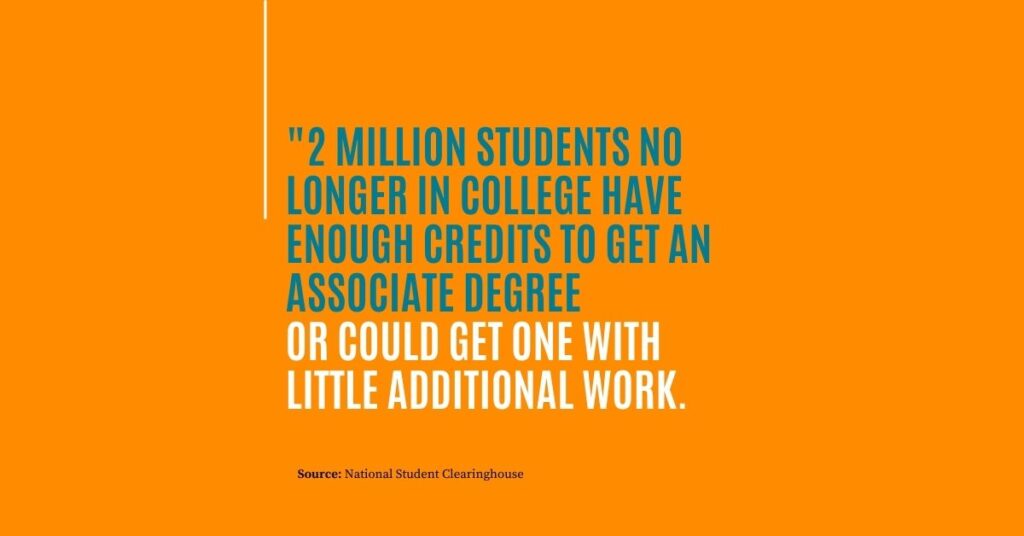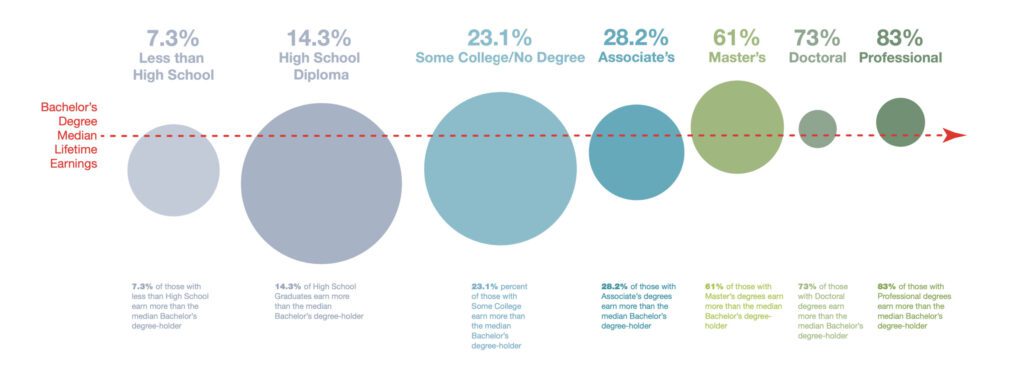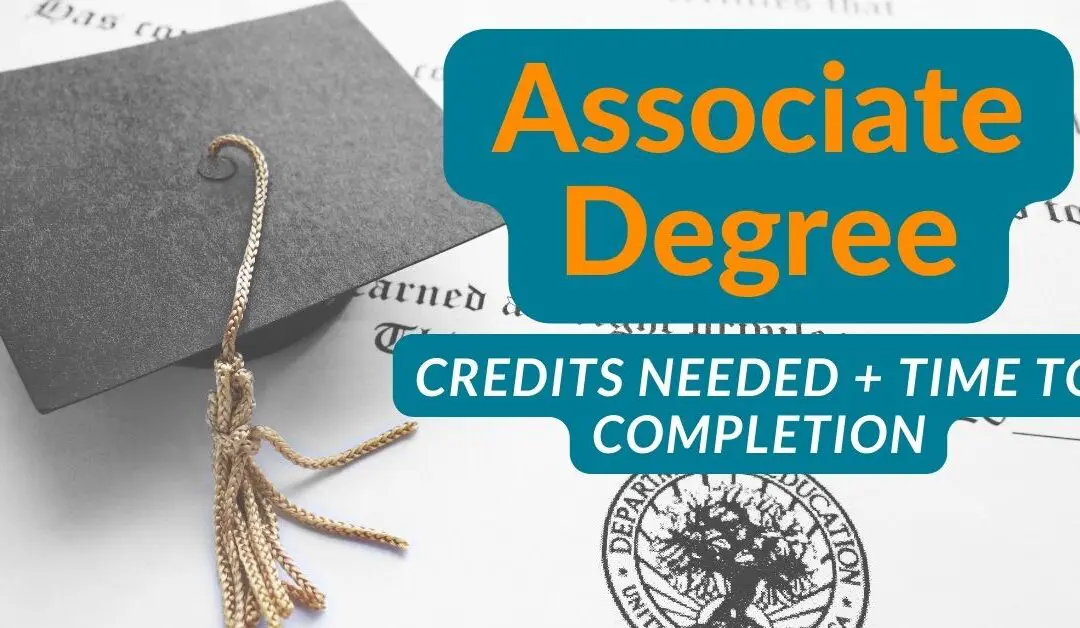Associate degrees are another way students can receive a credential and enter the job market or continue to acquire a bachelor’s degree at a university. Amongst California Community Colleges, several transfer pathways incorporate the successful completion of an Associate’s Degree program known as the Associate Degree for Transfer (ADT).
Obtaining an associate’s Degree Program is a great way to start your career. However, many people are unsure of what is required to obtain certification.
This blog post will discuss the typical length of an associate degree program and how many courses you need to complete to receive one. We hope this information will help you make the best decision for your future!
How Many Credits for an Associate’s Degree?
To receive an associate degree, you must earn at least 60 credits, which typically can be fulfilled by completing 20 three-credit courses.
Any California Community College may award an associate degree based on the criteria and governing philosophy in Title 5 § 55061-55063.
Compared to a bachelor’s degree, most bachelor’s degree programs require 120 credit hours for successful completion.
General Education Credits Associate Degree
Getting an associate degree doesn’t mean acquiring knowledge only about a specific field. It combines education with practical experience covering a variety of topics.
General education courses can be included in your associate degree in many fields. Think of your typical English 101 or Calculus 101 class, which will be three or four units and almost always transfers to the local institution you want to attend.
Beginner courses are integral to all associate degree programs to develop characteristics that help define an educated person.
What are the Types of Associate Degrees
California Community Colleges may award an:
- Associate in Arts (AA) degree,
- Associate in Science (AS) degree,
- Associate in Arts for Transfer (AA-T) degree,
- Associate in Science for Transfer (AS-T) degree.
Read More: What Is an Associate Degree? Requirements, Costs, and More
How Long Does it Take to Get an Associate Degree?
Put simply, most associate degree programs run for two years, but we suggest that rather than measuring the time it will take to earn your associate degree by months or years, consider it instead in terms of credit hours.

According to the US Department of Education, most American colleges and universities award college credit by the semester hour.
Related: When do UC Decisions Come Out?
What is a College Credit Hour?
Think of a college credit hour as the estimated time you will spend on coursework for the class.
Most college courses are between three or four credit hours, meaning you have one credit hour of instruction per week, plus the expectation that you will work on the coursework for an additional two hours outside the scheduled class time.
Credit hours are integral in determining your final GPA and eligibility for various federal financial aid programs.
Semester Format: Quarter or Semester System
While many traditional American higher education institutions follow academic years divided into two equal semesters of 15 or 16 weeks, others are divided into quarters.
The semester format of the institution you choose can significantly increase or decrease the number of classes you can take each year—thus shortening or lengthening the time it will take for you to earn your 60 credits.
For example, universities that offer online courses might also provide you with more opportunities to earn credits throughout the academic year.
Luckily, most community college programs have online classes that can contribute to enough credits that you graduate college and head to your bachelor’s program.
Associate Degree & Transferring to University
Associates degree programs are intended to achieve one of two aims: to help students prepare for a career or to provide a basis for a bachelor’s program.
Associate degrees should show evidence of communication, social science, humanities and fine arts, analytical and inferential reasoning, computational abilities, and the ability to learn independently.
Transferring from a California Community College to a CSU is made remarkably easy by completing an associate degree first, thanks to the Associate Degree for Transfer pathway.
However, one alarming problem for higher education advocates is the number of students who have no longer enrolled in college but have met the 60-credit threshold for acquiring an associate’s degree.
According to the Georgetown University Center on Education and Workforce, an estimated
“2 million students no longer in college have enough credits to get an associate degree, or could get one with little additional work.”
Source: National Student Clearinghouse
Throughout the United States, community college systems have been trying to increase the number of people who may get an associate degree by reverse transferring.
A reverse transfer procedure is where a student who earns credits at a two-year institution but transfers to a four-year institution may have some credits applied toward an associate degree at the four-year institution.

Fundamental to the reverse transfer process is the willingness of four-year institutions and two-year institutions to collaborate on shared agreements for course articulation.
Although you can achieve a degree with fewer classes, what does this mean in terms of long-term employability or salary earnings?
Associate Degree vs. Bachelor’s Degree Lifetime Earnings
The same study found that earning an associate degree means making $200,000 more over their lifetime than people with enough college credit for one but never graduated.
The number jumps to $400,000 lifetime earnings when associate degree holders are compared to high school graduates.
In contrast, bachelor’s degree holders earn 31 percent more than workers with an associate’s degree.
Using Those Unused Credits
Unused college credits can be used for a completed degree program down the road. Depending on the bachelor’s degree program, you may not have to take extra classes or achieve more credits than initially required.
If you receive an associate degree and enter the job market right after graduating, your previously earned credits do not expire. Instead, it will be applied to whatever bachelor’s degree programs you elect to enroll in at a future date.
Credits earned are credits earned, and transfer credits can be utilized in various ways to suit your institution’s policies and receive the credit you deserve.
The best action is to speak with the registrar’s office of the school you want to transfer to and identify whether your past transcripts can be evaluated for meeting graduation requirements and contributing to the required credits portion of the institution’s policies.
Associate Degrees Online
Pursuing an Associate Degree online is gaining steam in the ever-expanding world of online education. You can enroll and start your degree at your own pace, create career opportunities for yourself, and contribute to a college experience that does not require breaking the bank.
As online learning continues to gain steam, many institutions in the California Community College system are promoting online classes and online learning.
This has lifted the primary burden that would keep thousands of hard-working Californians out of community college classrooms: access and transportation.

Numerous online programs allow people to earn an Associate Degree from the comfort of their homes, so long as they have a computer and an internet connection.
These programs follow the same rigorous academic standards as traditional on-campus classes but with the increased flexibility of learning from anywhere.
If you’re interested in learning more about online associate degree programs in California, we suggest reaching out to the admissions offices of the community colleges you’re interested in attending. They’ll be happy to answer any questions and help you get started on the path to success.
Frequently Asked Questions (FAQ): Associate Degree
Should I pursue an associate degree if I am undecided on my major?
Moreover, the college credits you receive are primarily GE course requirements for most bachelor’s degree programs when completing an associate degree program.
For example, students who achieve a liberal arts associate degree will finish all of their GE’s at one school and will have additional credits that can be applied to a baccalaureate program they became interested in.
Is an associate degree enough?
According to the Bureau of Labor Statistics (BLS), bachelor’s degree holders have higher earnings than associate degree holders. At the same time, the same can be said about associate degree holders compared to high school graduates.

Can I achieve an Associate Degree in one year at a community college?
For most people, finishing an associate degree in one year is not realistic, nor would it be something we recommend. It also highly depends upon the number of credits required for the specific major you want and the transfer institution you are applying to.
Suppose it is a new program in a subject area that is highly selective, like information technology. In that case, the transfer value is higher, and it becomes more challenging to finish the program in two years and fulfill the required major transfer requirements.
Can I use previous college credits toward an Associate Degree, or do my college credits expire?
Whenever you enroll in college courses and complete the course, you receive the credit that can be applied in whatever way you see fit. In other words, the college course credit you receive is your credit, which can be applied to the general education and college major requirements for your bachelor’s degree program.
I would recommend speaking with the registrar’s office of the institution you attended to have your official transcript sent to the institution where you want to finish your program.
Conclusion
It takes 60 college credits to complete an associate’s degree requirement. Most students take two years to finish the program and try to satisfy the broad education standards outlined by the four-year degree program they’re interested in.
An associate degree provides valuable professional experience, and schools are interested in hearing about how your life experience shaped the student they are receiving. Financial aid options may be available for students, including international students, but appropriate filings need to occur before the deadlines.
Stopping after an associate degree may be the appropriate option depending on your career goals. You can feel comfortable, nevertheless, that the credits you earned will be applied to the bachelor’s degree you eventually enroll in (if that is the direction you elect to take).
If you need help transferring or would like support in the UC or CSU transfer application process, then please Contact Us for support.
We are a 501(c)(3) nonprofit organization that depends on the generosity of our donors to continue our work. If you support our Mission and what we do, please consider Donating.





